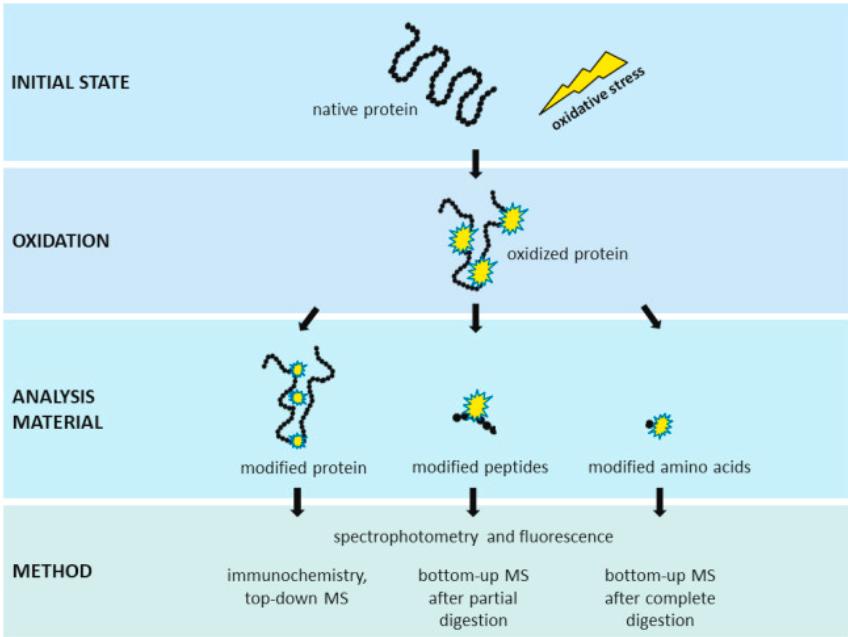
- Home
- PTMs Proteomics
- Proteomics Analysis of Oxidation
At present, mass spectrometry (MS) is the most accurate technique that has been widely used in protein post-translational modification (PTM) identification and analysis. Creative Proteomics is a leading custom service provider in protein/antibody PTM analysis. Here, we use high-resolution and accurate MS-based analysis methods and expand their application to biological samples to advance the knowledge of protein oxidation. We can provide services for a wide range of applications, from the role of protein oxidation in human diseases, monoclonal antibody (mAb) oxidation analysis, to food protein oxidation studies.
Protein oxidation is a complex chemical process involving both radicals and nonradicals. Usually, the amino acid side chain is the site of initial attack by oxidants, producing protein carbonyls, disulfide, dityrosine, and protein radicals. Subsequent changes in protein conformational structure and the formation of protein polymers and aggregates can lead to significant changes in solubility and functionality of the proteins, such as gelation, foaming, and water retention. Oxidatively modified proteins have been reported to be closely associated with human age and many diseases, including chronic aging, Alzheimer's disease, Parkinson's disease, atherosclerosis, and muscular dystrophy. In addition, food proteins and mAb-based drugs are subject to oxidation during production, processing, and storage. Consequently, oxidation of proteins leads to impaired function of food products and loss of product quality of mAb-based drugs.
 Fig. 1 Analysis of oxidative protein
modifications. (Kehm, Richard, et al., 2021)
Fig. 1 Analysis of oxidative protein
modifications. (Kehm, Richard, et al., 2021)
We provide a customized and high-sensitivity protein/antibody oxidation analysis service for the identification and quantification of oxidatively modified proteins. Our experienced scientists and dedicated analytical team focus on sample preparation to ensure reliable and reproducible analytical results. Sample preparation as soon as possible after sampling is essential to prevent changes in biological oxidation patterns or the formation of artifacts. Specifically, our service includes the following lists:

Protein oxidation products can be developed as suitable disease biomarkers because they are relatively stable, accumulate at detectable concentrations as well as correlate with disease severity.
Protein oxidation can occur at almost all stages of mAb development, such as cell culture, purification, and storage periods. Subsequent changes in protein conformational structure may affect the biological efficacy, stability, safety, and immunogenicity of mAb. Therefore, it is critical to monitor and characterize oxidation at different stages of drug development and manufacturing to ensure product stability and functionality.
Protein oxidation is prevalent in food systems and can also be induced by processing. Accumulated evidence suggests the consumption of extensively oxidized food (such as meat) could have a significant negative impact on the health of humans. Many oxidation processes may be controllable and actionable through antioxidant processing, packaging, and composition strategies.
Creative Proteomics is confident that our professional and enthusiastic services will greatly facilitate the progress of your projects. If you are interested in our services, please contact us for more details. Our clients have direct access to our staff and prompt feedback on their inquiries.
References
Our products and services are for research use only.